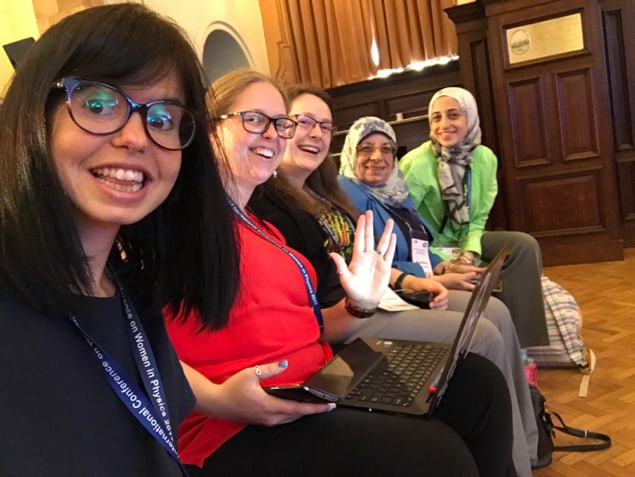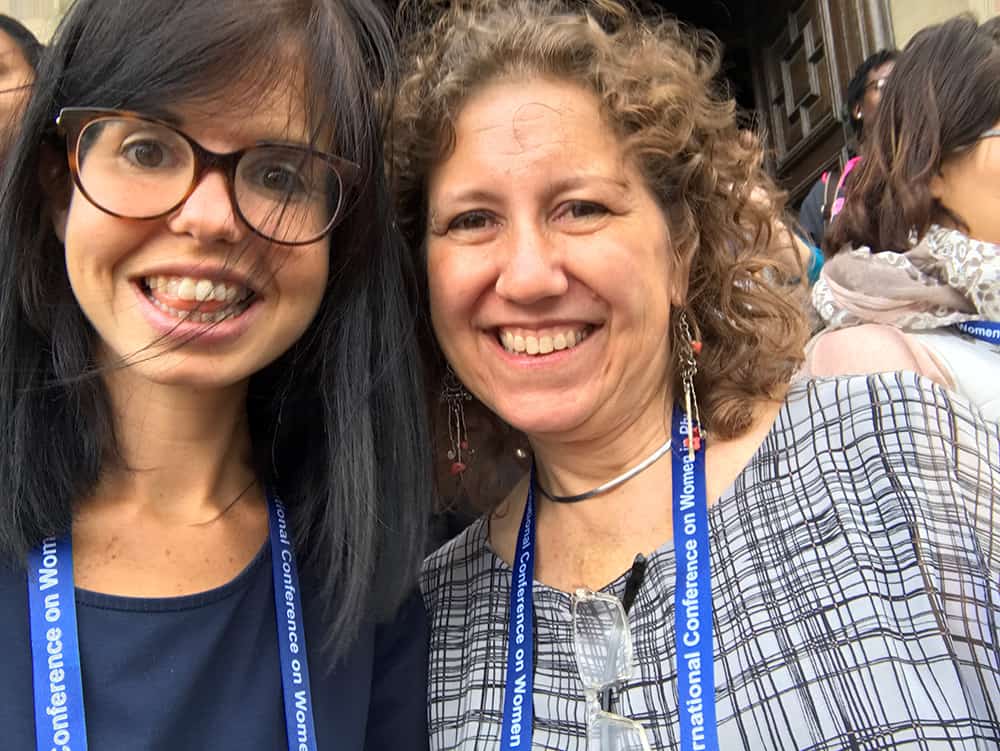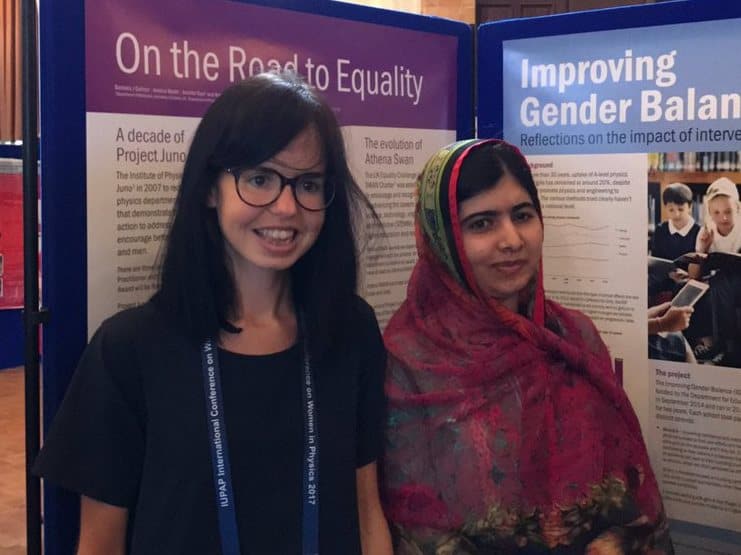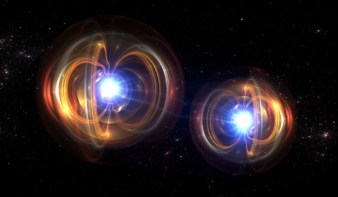Jess Wade reports from the International Conference on Women in Physics in Birmingham, UK

On accepting the Institute of Physics (IOP) President’s Medal at the International Conference on Women in Physics (ICWiP), Dame Jocelyn Bell Burnell closed with Laurel Thatcher Ulrich’s infamous quote – “Well-behaved women seldom make history.” And what does she say is the least well-behaved thing she’s done during her scientific career? Become a working mother. Jocelyn battled with stereotyping and bias because she was a woman in a male-dominated field who also dared to have a family and career. She persevered and refused to back down, going on to become an award-winning scientist, Fellow of the Royal Academy and Dame Commander of the Order of the British Empire (keep an eye out for a feature on Jocelyn Bell Burnell in Physics World later this year). Bell Burnell’s story was one of many awe-inspiring tales of ground-breaking women at ICWiP last week, which was held at the University of Birmingham in the UK – and here are some whose stories were too good to keep to myself.
Dame Athene Donald is a trailblazer. The first woman to be professor in a UK university and master of a Cambridge college, she has never been afraid to ruffle feathers or say what she thinks. She is an important member of more committees, assessment panels and boards than most academic departments combined, but still finds time to visit schools. And when she does, she challenges what they think: that physics is the Large Hadron Collidor at CERN and…men.
Donald is humble, observant and inquisitive – characteristics that have contributed to making her one of the world’s finest scientists and communicators. But the road hasn’t always been easy and the most difficult time in Donald’s life was mid-career. From the outside, it looked like she had made it, which is when the professional jealousy of others started to kick in. She was frequently the only woman on committees, where she was ignored, and she felt her research group was suffering from the lack of resources she could pull in. But Athene was not going to give up, instead creating a network of mentors and supporters and channelling anger into gender work. Donald was made the gender champion of Cambridge, which holds the only Athena Swan gold award for a physics department in the country. She began initiatives to support women returning from maternity leave, offered CV advice and frameworks for promotion, ran workshops on confidence and impostor syndrome, and helped postgrads with career advice. But with great power came great responsibility – from broadcast to print media, everyone wants Donald’s comment. Today, she advises everybody, from academia to pre-19 education and even parliament and the hardest part is learning to say no to other people’s requests.
There were several things in Donald’s lecture at ICWiP that particularly resonated with me. Other than a short time in the US, Athene has never left Cambridge. It was here she completed her undergraduate, PhD, first lectureship, first readership, first professorship. Here she became Fellow of the Royal Society and Dame. There is ongoing dialogue in academia that you should move across the country and world to gain an “international reputation” and improve your academic status. Her commitment to her husband, children and parents demonstrates that being successful is not “either/or”.
The Institute of Physics’ president-elect, chemical engineer Dame Julia Higgins was instrumental in establishing the Athena Swan (Scientific Women’s Academic Network) charter in 1999. She began her quest for diversity in the 1990s, “I had always assumed that if I looked over my shoulder there would be more following up behind, but there weren’t.” She was the first woman to become both a Fellow of the Royal Society and of the Royal Academy of Engineering. When Higgins became a professor of polymer science at Imperial College, London, she doubled the number of women at that level. Over her career she has seen the ratio change – there are now more than 50 female professors at Imperial – but she’s still not happy with it. “When we set up the Athena Project, we called it a project because we intended it to be time-limited. There is still a great deal to do.” If you’re interested in Higgins’ research, listen to her on the BBC radio show Life Scientific.

Gabriela González is part of the 1000-person team that detected gravitational waves. In fact, she’s a pretty important part. González is a professor of physics and astronomy at Louisiana State University in the US and the former spokesperson of the LIGO Scientific Collaboration. Her plenary talk at ICWiP was a whistlestop tour into general relativity; starting in a Swiss patent office and ending in a €400m space antenna. González began her career trying to detect gravitational waves from the orbiting neutron stars first observed by Bell-Burnell; an undertaking so complicated even Einstein said it would never be done. They were so determined to detect gravitational waves that her team designed the Laser Interferometer Gravitational-Wave Observatory (LIGO) using technology that hadn’t been invented, with absolute confidence that the scientific community would catch them up. Gradually they pushed the sensitivity of their system further, resolving astrophysical events deeper into outer space. As they tweaked and tested, the physics community was in total suspense – then came challenges to LIGO’s suspension. For statistical certainty, they would need less noise and more light… “Sounds simple right? Well, it’s not very simple – and it’s quite expensive.” The build-up to turning on the detector took over Gabriela’s life: “I was so stressed about preparing for this. I would dream about protocol and analysis – watching out for lightning bolts, reading about earthquakes.”
She wasn’t only concerned whether the accuracy would be good enough – she wanted her team to be good enough too. When you see a page of logos or an author list, it is easy to forget that behind them there are real people living complicated lives. Having such a large team of people from different cultures also makes it easy for bad behaviour to slip under the radar. Gabriela ensured there was an anti-harassment initiative for the LIGO Scientific Collaboration and the Virgo Collaboration (read more here: LVC Allies), along with an active diversity committee that offered training and support. The coalescence of binary black holes detected on 14 September 2015 was the first notes that we have heard of gravity’s symphony. “It has been very exciting, but it’s going to be even more exciting.”
It was difficult to work out how the organizers of ICWiP could make the event even more inspiring following such trailblazers. Enter Nobel laureate Malala Yousafzai.

Malala finished her A-levels two weeks ago and from there she jumped on a plane (technically 10 planes) to tour the world on a “Girl Power Trip” with the Malala Fund. So far, she’s had lunch with Justin Trudeau, spent her birthday in Iraq with girls who lived in ISIS captivity, and visited Nigeria, which has the highest number of out-of-school girls in the world. By the end of the adventure, she will have spoken in Africa, North America, the Middle East, Latin America and Europe. And, thanks to the efforts of the Pakistani team, Malala found herself in a conference hall in Birmingham, speaking to 200 excitable physicists. Despite enjoying it when she lived in Pakistan, Malala didn’t study physics at A-level. Next year she will be studying PPE at the University of Oxford (I am sure she could already teach the course, but I’m also keen for her to be prime minister one day, and this degree seems mandatory). She recognizes the need to get more girls into physics, and agrees with much of the IOP’s Improving Gender Balance report. This is an issue for schools, parents and communities to solve. She was graceful, considerate and engaging and she didn’t only talk about her Nobel-prize-winning mission but listened to ours.
So how will we overcome the gender imbalance in physics? For that I turn again to Higgins: “The best thing that I could do for women in science was to be one and to be successful.”



